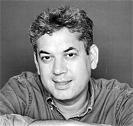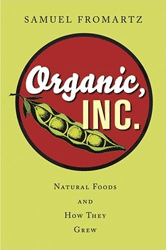 |
|||||||||||||||||||||||||||||||
|
|||||||||||||||||||||||||||||||
It's a book about the growth of a cultural movement, organic food. It began with an ideal vision of farming, food and health, then grew into a multibillion-dollar industry. I was curious about how it began and why it succeeded and why so many of the pioneers have had trouble with that growth. You could say the book's about what happens when ideals meet the marketplace. So how did organic food come about? Well, you can trace the roots back as far as the 19th century Romantics, who conceived of alternative food consumption. But the actual organic idea is about a century old and arose as a response to industrial farming and the early use of chemical fertilizers. What I realized was that organic farming has always been conceived as an "alternative" and that's in large part why it succeeded with consumers. Consumers want an alternative? Yes, and now more than ever. Food scares have driven organic food consumption, like Mad Cow disease in Europe, though this kind of "panic for organic" tends to be short-lived. Organic food continues to grow because it's viewed as healthier, more nutritious and fresher. Surveys show this time and again. Organic food has a clear identity as an alternative in the way it's grown, marketed and consumed. Consumers are voting for it with their wallets. In fact, organic food is one of the only free market sectors of American agriculture. It was actively opposed by the USDA right up until the 1980s. It exists solely because organic producers provided a product consumers wanted, even if they had to pay more. Organic farming isn't backed by any farm subsidies. It hardly gets any research money. It's a free market, which is highly unusual in agriculture. So why is the organic movement conflicted? Many organic farmers and consumers have had trouble with the industry's growth, especially with the entry of big companies into the sector. For many, this kind of corporate ownership chafes at the ideals of local and small-scale foods, such as farmers' markets. They also worry these companies will loosen organic regulations, a process many think is underway. What I found was that the demand for organic food proved so robust that the small-scale system couldn't quite meet it. Ironically, an anti-industrial movement needed an industry to support its growing success. So small distributors merged to form bigger ones. Whole Foods Markets, the largest natural and organic grocer, gobbled up regional supermarkets. And smaller companies sold out to get the capital to expand and win larger distribution. Is one organic vision now prevailing? No, because it's not a zero-sum game. Farmers' markets are growing and so are organic food companies. While each might have a different approach, or even philosophy, the same consumer is shopping at both venues. Small farmers provide the heart and soul of the movement. The larger outlets provide the distribution muscle to bring the food to a bigger audience. The two camps often are at odds, but they need each other too. What will readers get from the book? Well, I think it will be eye-opening to anyone curious about organic food. It may disabuse them of some assumptions, or raise new questions about what they're buying. What I hope is that readers will come away with a better appreciation of what it takes to be the "alternative," how challenging it is to follow an idealistic path in a pragmatic way. And how important consumers are to that process. How did you get interested in the topic? I had been shopping at Whole Foods here in Washington, D.C., saw how successful the store was and bought the stock. It was the only stock I owned that weathered the dot-com bust. Only later did I realize that there was a story here – one that was driving the stock higher. So I sold the shares, cutting any financial ties I had to the industry, then began the book project. It started with two simple questions: Where did organic food come from and why was I buying it? Are you an organic farmer? The only direct experience I've had in agriculture was working in a tree planting co-op in northeast Washington State. This was 1980, just after I graduated from Reed College. My hair was longer then and the little Douglas Fir seedlings we planted are full-grown trees. Aside from that experience, I belong to a community garden on Capitol Hill and grow a lot of leafy greens and tomatoes – organically, of course. But I still shop at the farmers' market. When is the book available? The book is out from Harcourt on April 10, 2006.
|
|||||||||||||||||||||||||||||||
Copyright © Samuel Fromartz, 1994-2006 All rights reserved
|






 What is Organic, Inc. about?
What is Organic, Inc. about?